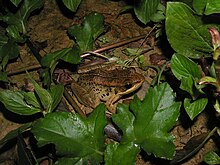Nidirana adenopleura
| Nidirana adenopleura | |
|---|---|

| |
| Scientific classification | |
| Domain: | Eukaryota |
| Kingdom: | Animalia |
| Phylum: | Chordata |
| Class: | Amphibia |
| Order: | Anura |
| Family: | Ranidae |
| Genus: | Nidirana |
| Species: | N. adenopleura
|
| Binomial name | |
| Nidirana adenopleura (Boulenger, 1909)
| |
| Synonyms | |
| |
Nidirana adenopleura is a species of frog in the family Ranidae.[2][3] It is found in Taiwan, south-eastern China, and in the Yaeyama Islands (Ryukyu Islands, Japan). Populations from Yaeyama Islands might represent a distinct, as yet undescribed species. The records from Vietnam and Thailand are uncertain.[2]
Description
[edit]Nidirana adenopleura is a medium-sized frog growing to 4.5 centimetres (1.8 in) snout-vent length. Upper surfaces are light brown to brownish green; the underside is whitish. There is a light golden brown line running from the tip of nostril backward through the upper eyelid and along the dorsolateral fold to the hip. The upper jaw has a yellow stripe. The sides of the body are light brown to grayish brown, with some dark markings. The iris is golden above and reddish golden below.[3]
Reproductive season is from March to September. Males have a loud advertisement call and start calling after sunset, and may keep on calling whole night, even continuing after sunrise. Females lay eggs near pond margins.[3]
Habitat and conservation
[edit]Nidirana adenopleura's natural habitats are paddy fields, marshes, ditches, ponds, and lakes with abundant submerged vegetation at low elevations.[1][3] It is a common species not considered threatened by the International Union for Conservation of Nature (IUCN), although habitat destruction and degradation are probably threats.[1]
References
[edit]- ^ a b c IUCN SSC Amphibian Specialist Group (2020). "Nidirana adenopleura". IUCN Red List of Threatened Species. 2020: e.T81656230A63874005. doi:10.2305/IUCN.UK.2020-1.RLTS.T81656230A63874005.en. Retrieved 15 November 2021.
- ^ a b Frost, Darrel R. (2020). "Babina adenopleura (Boulenger, 1909)". Amphibian Species of the World: an Online Reference. Version 6.0. American Museum of Natural History. Retrieved 12 January 2020.
- ^ a b c d Lue, Kuang-Yang. "Babina adenopleura". BiotaTaiwanica: Amphibian Fauna of Taiwan. Taiwan Biodiversity Information Facility. Archived from the original on 22 November 2015. Retrieved 22 November 2015.

